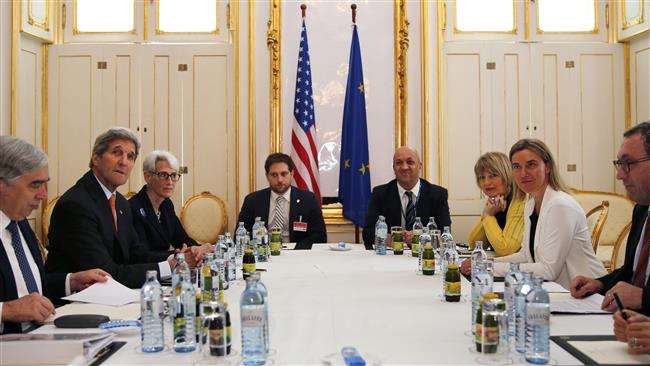Strong political will needed for Iran-P5+1 deal: Mogherini

Iran and the P5+1 group of world powers are likely to reach a final agreement on Tehran’s nuclear program if both sides show “strong political will,” European Union’s foreign policy chief, Federica Mogherini, says.
“I’m rather positive that if the strong political will is there from all the parties, we can get there,” Mogherini said Sunday upon her arrival in the Austrian capital of Vienna where nuclear talks are under way between Iran and six world powers.
She added that the planned negotiations between the two sides in the next two days before a self-imposed deadline will be “tough… but not impossible and as I said it’s a matter of political will.”
“It is going to be tough but the political will is going to be based on the need that the international community has to find a good agreement,” the EU official said.
She said the negotiating parties are going to take stock of the important work conducted by their teams over recent months to translate a mutual understanding they reached in the Swiss city of Lausanne in April into a sound politically agreement.
Noting that the parties will focus on the main points that are still open, Mogherini expressed hope that they will manage to finalize the nuclear deal in the next couple of days.
“We stick to the foreseen timetable. If a few days more are needed, we can take them,” she added.
She emphasized the importance of a final agreement between Iran and the six global powers, saying, “It’s most of all a non-proliferation agreement, so it’s our security, security of the world is at stake.”
Mogherini added that all the sides are very much aware of the fact that “this is a process that originated from the UN Security Council resolutions.”
Iran FM returning to Tehran
Iran’s Foreign Minister Mohammad Javad Zarif will leave the nuclear talks in Vienna and return to Tehran later on Sunday, a spokesman for the Iranian delegation said.
The unnamed spokesman added that Zarif and US Secretary of State John Kerry have given their teams necessary guidelines regarding ways to proceed with the final text and its details.
“After a day-long stay in Tehran,” the Iranian foreign minister will return to Vienna while other members of the Iranian negotiating team will continue the work on the final text, the official explained.
He said if more time is needed to work on the text of the agreement, negotiations will go beyond the June 30 deadline.
He emphasized that the two sides’ representatives will stay in Vienna after the deadline because there is still lots of work to do and will proceed with the talks “to reach a good comprehensive agreement.”
There is no desire or word yet about a long-term extension of the nuclear talks, he said.
Very big challenges in nuclear talks: Britain
British Foreign Secretary Philip Hammond told reporters upon his arrival in Vienna on Sunday that no final nuclear deal between Iran and the P5+1 is better than a “bad deal.”
“We still have very big challenges if we are going to be able to get this deal done,” Hammond said.
“I have said many times before and I will say it again today, no deal is better than a bad deal. There are red lines that we cannot cross and some very difficult decisions and tough choices are going to have to be made by all of us,” he added.
One step away from final deal: China
Chinese Deputy Foreign Minister Li Baodong said the two sides are “just one step away from the end” of the nuclear marathon.

“We must clinch a quick victory. We have never been so close to a final agreement. We must look into progress and try to reach a comprehensive deal… We cannot delay again and again,” Li said.
Iran and the five permanent members of the UN Security Council – the United States, France, Britain, China and Russia – plus Germany are holding talks to finalize the text of a possible deal over Iran’s nuclear program by the end of June.
The two sides reached mutual understanding on the key parameters of the potential deal in Lausanne on April 2.







